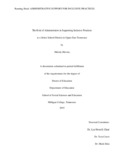| dc.description.abstract | The implementation of inclusive practices has increased in response to the federal mandate for students with disabilities to be educated with their typically developing peers “to the maximum extent possible.” Previous research indicates that teachers frequently cite a need for administrative support to implement inclusive practices successfully. This qualitative study examines the role of administrative support for inclusive practices by interviewing teachers and principals in a select school district in Upper East Tennessee and comparing their perspectives. Results indicated that both groups had similar viewpoints regarding the role of administrators in supporting inclusive practices. The findings suggest that scheduling, professional development, schoolwide culture, and relationships are critical to supporting inclusive practices. Implications for practice include establishing a schoolwide schedule that reflects student needs, providing regularly scheduled collaborative planning time for general and special education teachers, working collaboratively with teachers to identify professional development needs, and contributing to the culture of the school by establishing positive relationships with students and staff. | en_US |

